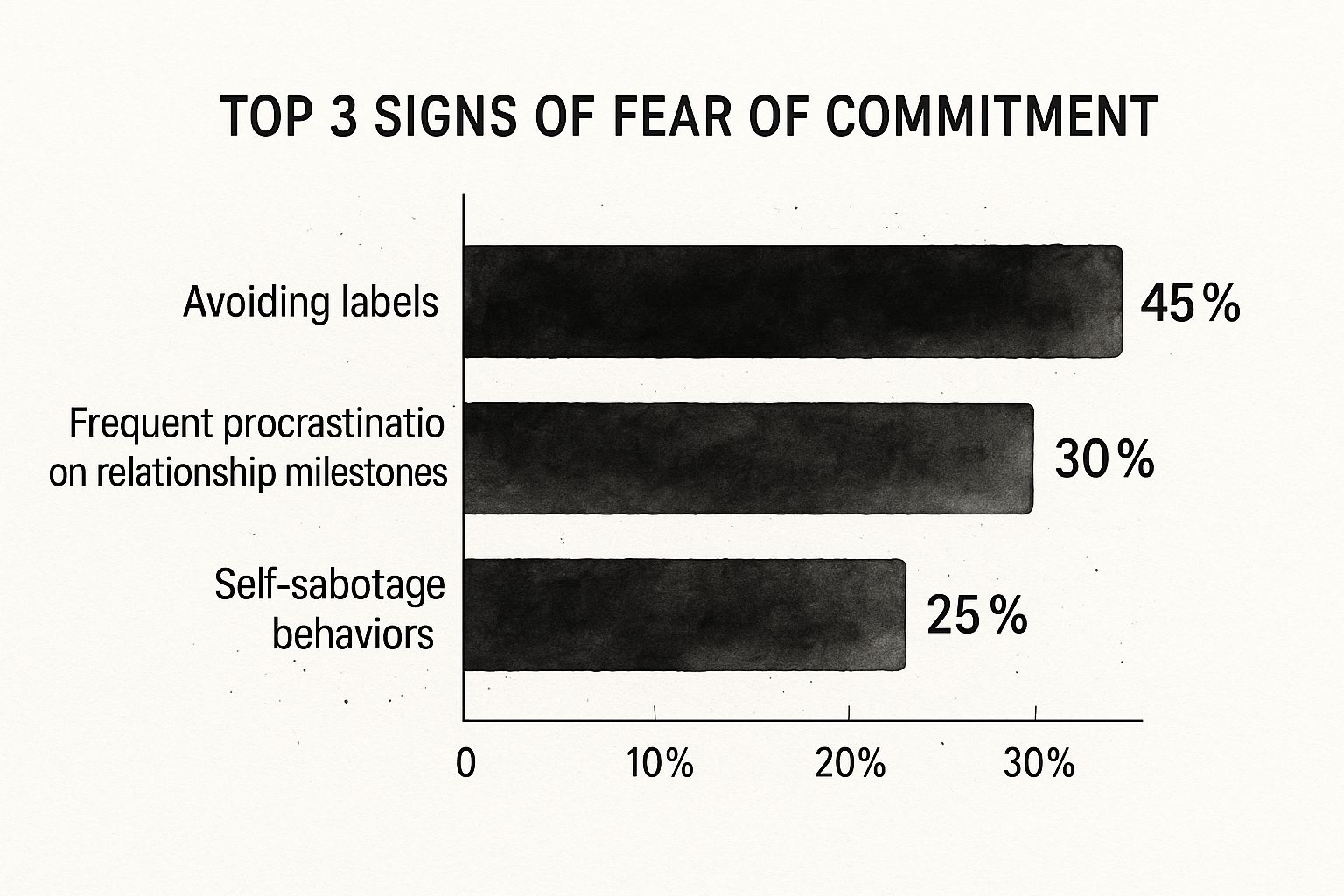Getting past a fear of commitment isn’t about flipping a switch. It’s a process of first understanding where that fear comes from and then, step-by-step, building a new sense of trust—both in yourself and in your relationships. It means getting real about your anxieties, learning to talk about them, and actively questioning the old stories that are holding you back.
So, Why Are You Afraid to Commit?

Before you can figure out how to move forward, you have to look inward. This hesitation you’re feeling? It’s rarely just about the person you’re with. More often than not, it's connected to your personal history and the emotional blueprint you’ve been carrying around for years.
It’s almost like you’re following an invisible script, one written by experiences from long ago, and you might not even realize you’re reading from it.
Unpacking Your Personal History
Let’s dig into what might be holding you back. As you read through these common sources of commitment fear, see if any of them resonate.
- Lingering Pain from Past Relationships: A bad breakup or a betrayal can leave behind some serious emotional shrapnel. If a past partner cheated or suddenly walked away, it's completely natural to build a fortress around your heart to prevent it from happening again. You keep new partners at arm's length, just in case.
- Witnessing Difficult Family Dynamics: If you grew up watching your parents fight constantly, go through a messy divorce, or just seem emotionally distant, your view of long-term partnership gets skewed. You may have subconsciously learned that commitment equals pain, loss of control, or unhappiness.
- A Deep-Seated Fear of Losing Freedom: For a lot of people, commitment feels like a cage. You might worry that a serious relationship means giving up your independence, your hobbies, your friends, or the personal goals you’ve set for yourself. This fear isn't really about your partner; it's about protecting your own identity.
If this sounds familiar, you’re far from alone. A 2017 Pew Research study revealed that 42% of Americans were not living with a spouse or partner. This trend is partly tied to a growing reluctance to commit, sometimes driven by a "grass is greener" mindset where the fear of missing out on someone "better" keeps you from choosing someone great right now.
Key Takeaway: The impulse to flee when things get serious or the habit of nitpicking a partner’s tiny flaws are classic signs. These aren't just personality quirks—they're defense mechanisms trying to protect you from what feels like a threat.
Seeing these patterns in yourself is the first, most powerful step toward rewriting that script. While this is something anyone can experience, you can explore the specific reasons why men are afraid of commitment in our related article. Once you connect the dots between your past and your present, you’ll have the clarity you need to start building relationships that feel secure, not scary.
Decoding Your Specific Commitment Anxieties
Before you can work through a fear of commitment, you have to get specific about what you’re actually afraid of. "Commitment phobia" isn't just one big, scary monster; it's more like a tangled mess of very specific anxieties. The first real step is to start untangling that web to see what’s truly holding you back.
Often, the fear isn't about the person you're with at all. It’s about what you think the relationship will cost you—your freedom, your sense of self, your future. These anxieties usually hum along just beneath the surface, driving confusing behaviors that even you might not fully understand.
Pinpointing Your Core Fears
So, let's get granular. Most commitment issues boil down to a few core fears. As you read through these, see which one makes your gut clench. That's probably where your work lies.
- Fear of Losing Your Identity: This is a big one. It's the nagging worry that a partnership will slowly erase who you are. You might find yourself resisting the natural merging of two lives—friends, hobbies, routines—because you're terrified of losing the "you" that exists outside the relationship.
- Fear of Being Trapped: Does the idea of "forever" feel less like a promise and more like a prison sentence? This anxiety can make a long-term relationship feel like a cage. The moment things start getting serious, a panic button goes off in your head, and your first instinct is to bolt.
- Fear of Getting Hurt: If you’ve been hurt badly in the past, this fear is your emotional bodyguard. It's a powerful defense mechanism that can lead you to unconsciously sabotage a perfectly good thing. You might pick fights or end things pre-emptively, figuring it's better to leave on your own terms than to risk being abandoned or betrayed again.
- Fear of Making the Wrong Choice: We live in a world of seemingly endless options, and that can be paralyzing. This anxiety traps you in a cycle of "what if?" What if there's someone better out there? It leads to constant second-guessing and makes it impossible to feel settled and secure with the person right in front of you.
These fears don't come from nowhere. They're often tied to deeper patterns. It can be incredibly helpful to explore the different attachment issues in relationships to see how your past might be shaping your present.

As you can see, something as simple as avoiding labels is a massive sign. It's a clear attempt to keep the relationship from feeling too "real" and, therefore, too threatening.
Identifying Your Personal Triggers
This isn't just theory; the patterns are real and widespread. One compelling study revealed that 86% of men who identified as commitment-phobic were primarily afraid of losing their personal freedom, while 72% were driven by a fear of getting hurt.
Here’s a quick exercise to help you get started.
Use this table to pinpoint the specific anxieties that might be impacting your relationships.
Common Fears Behind Commitment Anxiety
| Specific Fear | What It Feels Like | Common Thought Pattern |
|---|---|---|
| Losing Your Identity | A sense of being smothered or disappearing into the relationship. | "If I commit, I'll have to give up my hobbies, my friends, my whole life." |
| Being Trapped | Panic or claustrophobia when thinking about the future with one person. | "This feels permanent. What if I want to leave someday and I can't?" |
| Getting Hurt Again | Hyper-vigilance, waiting for the other shoe to drop based on past pain. | "They seem great now, but they'll eventually betray me just like everyone else." |
| Making the Wrong Choice | Constant second-guessing and comparing your partner to others. | "Is this the best I can do? What if there's a better match for me out there?" |
Take a moment to really sit with these. Which one feels the most familiar?
Giving your anxiety a name—whether it’s a fear of being trapped or a fear of losing yourself—is the most important thing you can do. It transforms a vague, overwhelming feeling into a specific, manageable problem. And once you have a problem you can define, you can start building a plan to solve it.
Practical Strategies to Get Ready for Commitment

Figuring out why you're scared is half the battle. But real, lasting change? That comes from taking action. This is where you start building your "commitment muscle" with small, deliberate steps. You don’t need to take some terrifying leap into the future. It’s all about taking a series of confident little steps, right here and now.
The whole point is to prove to yourself, through actual experience, that commitment doesn't have to be a trap. It can be a choice you actively and freely make, day by day.
Ground Yourself in the Present Moment
When that anxiety about the future kicks in, your mind probably goes into overdrive with "what if" scenarios. Mindfulness is an incredibly powerful tool for pulling yourself out of that tailspin and back into the present, which is the only place you actually have any control.
Instead of getting swept away by anxious thoughts about what might happen next year, bring your focus back to right now. A simple grounding exercise can work wonders. When you feel that familiar knot of panic tightening, give the 5-4-3-2-1 technique a try:
- 5: Name five things you can see in the room (your coffee mug, a picture frame, a scuff on the floor).
- 4: Acknowledge four things you can feel (the weight of your phone in your hand, the fabric of your pants, the floor beneath your feet).
- 3: Listen for three things you can hear (a car driving by, the hum of the fridge, your own breath).
- 2: Notice two things you can smell (lingering coffee, fresh air from an open window).
- 1: Identify one thing you can taste (maybe the mint from your toothpaste or the last sip of water).
This simple exercise forces your brain to shift its focus to your immediate sensory experience, effectively hitting the brakes on that anxiety spiral. It's a quick, tangible reminder that in this exact moment, you're okay.
Try Talking About It (The Right Way)
One of the biggest mistakes I see people make is trying to hide their fears from their partner. It feels safer, but all it really does is create distance and confusion. The key is to voice your anxieties in a way that invites your partner in, rather than pushing them away.
Here are a few ways you can frame these crucial conversations:
- To share your feelings without placing blame: "I'm so happy with where we are, but I want to be honest—sometimes I get overwhelmed thinking about the distant future. It's a me-thing I'm working on, and it has nothing to do with you or how I feel about us."
- To set a gentle boundary: "To feel comfortable and not get ahead of myself, I really need to take things one step at a time. For me, that looks like just enjoying what we have right now without trying to plan too far down the road."
Key Takeaway: Honesty, when done right, builds a bridge. When you let your partner see your vulnerability, you’re giving them a chance to show up with support and understanding. This actually strengthens the relationship instead of weakening it.
Take Small, Manageable Steps Forward
The only way to convince your brain that commitment isn't the monster you've made it out to be is to give it a track record of small wins. Forget the five-year plan for now. Just focus on the next right thing.
Think of it like a gentle form of exposure therapy for your relationship. You start with low-stakes commitments and slowly build from there.
-
Instead of: Freaking out about moving in together.
-
Try: Planning a weekend getaway a month from now. This is a perfect test run. It involves making a future plan, coordinating logistics, and spending a chunk of time together—all in a manageable, low-pressure package.
-
Instead of: Panicking at the mere thought of marriage.
-
Try: Creating a shared, recurring plan. It could be a dedicated weekly date night or even just starting a new show that you only watch together.
Every time you follow through on one of these small promises, you send a clear message back to your brain: "I can handle this. This is safe." This slow, steady process begins to rewire your automatic fear response, turning that overwhelming dread into earned confidence. One small step at a time.
Why Commitment Feels Impossible When You Have Infinite Options
Let's be honest: modern dating can feel like shopping from a bottomless Amazon warehouse of people. Dating apps serve up an endless carousel of new faces, while social media feeds us a constant diet of impossibly perfect-looking couples. It's no wonder so many of us have a nagging "what if?" voice in our heads.
This creates a bizarre paradox. We have more choices than any generation in history, but actually making a choice feels crippling. The fear of missing out (FOMO) becomes a third person in the relationship, constantly whispering that someone "better," "fitter," or "more aligned" is just one swipe away. It makes it incredibly hard to plant your feet and appreciate the great person standing right in front of you.
How Our Digital Lives Feed Relationship Anxiety
This sense of unease is a hallmark of our times. You might catch yourself "hesidating"—dragging your feet on committing because you're just not sure if this is it. That indecision is often fueled by the very technology that’s supposed to bring us together.
This isn't just a feeling; it's a documented trend. The growing fear of commitment is tangled up in our online habits. Globally, about 39% of young people now spend more time socializing online than in person. This has created a weird blend of hyper-connectivity and profound loneliness.
Experts call it a 'vicious cycle.' More time on social media can lead to feeling more isolated. That isolation can feed into anxiety and a fear of rejection, which is the perfect fuel for commitment phobia. For a deeper look at this trend, there's a great article on why today's generation fears commitment on soulnspiritblog.com.
The digital world makes genuine connection feel both totally necessary and absolutely terrifying. We're starving for intimacy but have been trained to always keep an eye out for the next best thing.
Tuning Out the Noise to Find Your Focus
If you want to get a handle on your fear of commitment, the first step is to turn down the volume on all that external noise. It’s about creating the mental space to listen to yourself and nurture the actual relationship you're in, not the thousands of imaginary ones on your phone.
Here are a few ways to start taking back control.
-
Swipe with a Purpose, Not for a Rush. Stop the mindless swiping. Before you open an app, get clear on what you’re actually looking for. Give yourself a time limit and focus on having a few real conversations instead of just racking up matches like points in a game.
-
Curate Your Social Media Feeds. Be ruthless. Unfollow any account that makes you feel like your life or relationship isn't good enough. You're only seeing the highlight reel, not the messy, complicated, and beautiful reality behind the pictures.
-
Double Down on Real-Life Connection. Intentionally invest in face-to-face time. The moments that build a real bond—laughing until you cry over a shared pizza, navigating a stressful day together, or just taking a quiet walk—can't be replicated by a text or a "like."
By managing your digital world more mindfully, you start shifting your energy away from the endless, hypothetical "what ifs" and back to the real, tangible person by your side. That’s how you build real confidence in your choice, free from the pressure of a world screaming that there's always something better.
When to Get Professional Support

Working through a fear of commitment on your own is a huge act of courage. It really is. But it’s just as important to recognize when self-help strategies have taken you as far as they can.
Sometimes, the roots of this fear are tangled up in experiences that are just too complex to unravel by yourself. If you feel like you’re stuck in a recurring pattern of self-sabotage, it might be time to bring in a professional.
Reaching out isn’t a sign of failure. Far from it. It’s a sign that you're ready to get serious about your healing.
Recognizing the Signs You Need Help
So, how do you know when you've hit a wall? There are a few key patterns that often signal the issue goes deeper than simple cold feet. If these themes feel familiar, seeking support is a powerful next step.
- Your Fear Causes Significant Distress: This isn't just about mild anxiety before a big date. We're talking about a fear that actively causes you pain, maybe leading to depressive symptoms or spilling over into other parts of your life, like work or friendships.
- A History of Trauma: If your past includes abuse, neglect, or growing up around intense instability, those experiences leave deep emotional wounds. Healing them safely often requires a therapist's guidance.
- You Repeatedly Sabotage Good Relationships: Does this sound familiar? You meet someone great, things start getting serious, and then—bam—you impulsively end it for reasons you can't quite explain later. This is a classic sign of deep-seated attachment issues at play.
Seeking therapy is a proactive move toward taking control of your relational health. It’s about giving yourself the tools to build the future you want, rather than letting your past dictate it.
Finding the Right Kind of Support
When you decide you're ready, the key is to look for a therapist who specializes in relationship dynamics, attachment theory, or trauma. These professionals have the specific training needed to help you connect the dots between your past experiences and your present fears.
Many therapists use incredibly effective, evidence-based approaches. For instance, Cognitive Behavioral Therapy (CBT) is fantastic for identifying and challenging the negative thought patterns that fuel commitment anxiety. A therapist can help you reframe thoughts like, "All relationships end in pain," into something more balanced and realistic.
To get a better sense of what this process actually feels like, exploring different relationship therapy techniques can take a lot of the mystery out of it and show you what to expect.
Making that first call can feel daunting, I know. But it's often the most powerful step you can take to finally break free from the cycle of fear and build the secure, lasting connection you truly deserve.
Wrestling with Common Questions About Commitment
As you start untangling this fear of commitment, you're bound to have questions pop up. It's a messy, complicated part of being human, and feeling a little lost is completely normal. Think of this as a sort of FAQ for your feelings—just some straight-to-the-point answers for the stuff that's probably been swirling around in your head.
Getting clear, simple answers can cut through a lot of the anxiety. It helps turn a big, scary monster of a problem into something you can actually look at and work with.
Is This Fear of Commitment Something I Can Actually Fix?
Yes, without a doubt. A fear of commitment isn't some permanent flaw in your character. It’s almost always a learned response, a defense mechanism your brain built based on things you've been through. And anything that can be learned can be unlearned.
Tackling this fear is really about building new reflexes, emotionally speaking. You start by figuring out what sets you off, then you practice being a little more open in ways that feel safe, and slowly, you teach yourself that commitment doesn't have to be a trap. It really can be a source of safety and joy. It takes work and you have to be kind to yourself through the process, but it is absolutely possible to get there.
How Do I Even Begin to Talk to My Partner About This?
This is the big one, isn't it? The conversation that feels like it could break everything. The trick is to present this as your challenge, not a problem with them or your relationship. Stick to "I" statements. It makes all the difference.
For instance, rather than blurting out, "You're pushing me," try something like, "I'm feeling really anxious and overwhelmed right now, and for me to feel safe, I need to take things a bit more slowly."
My Advice: Don't spring this on them in the middle of a tense moment. Pick a time when you're both calm. Start by telling them how much you care about them, and then explain that this fear is your thing to work through. This approach invites them to be on your team, instead of making them feel like they're the enemy.
Am I Just Not Ready, or Is This a Real Fear?
This is such a critical distinction. From the outside, "not being ready" and having a true "fear of commitment" can look identical. But on the inside, they're worlds apart.
-
Not Being Ready: This is usually about logistics and timing. Maybe you're laser-focused on your career, still getting over a nasty breakup, or just have too much on your plate. It’s a practical assessment that commitment just isn’t a fit for your life right now. The idea of a future relationship doesn’t send you into a cold sweat.
-
Fear of Commitment (Gamophobia): This is a much deeper, more gut-level anxiety that shows up even when everything seems perfect—the person is amazing, the timing is right, but you still feel a profound sense of dread. This fear often feels irrational and brings on intense reactions like a full-blown panic, a desperate need to escape, or even causing fights to push the other person away. It’s not about the circumstances; it’s about a core belief that commitment itself is dangerous.
Getting clear on which one you’re experiencing is the first step. If it's situational, maybe all you need is time. But if it feels more like that deeper, more primal fear, then the work we’ve been talking about—digging into your past and maybe getting some outside support—is your best path forward.
At Poke Match, we believe everyone deserves a shot at building a healthy, secure relationship. For more real-world advice on navigating dating and connection, check out all of our resources at https://poke-match.com.
